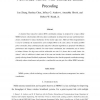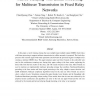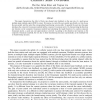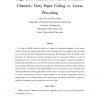127
click to vote
ICASSP
2011
IEEE
14 years 5 months ago
2011
IEEE
This paper presents a detailed sum rate investigation of Zero-Forcing (ZF) detectors over composite multiple-input multiple-output (MIMO) channels. To this end, we consider the ge...
129
click to vote
ICASSP
2011
IEEE
14 years 5 months ago
2011
IEEE
Grassmannian beamforming is an efficient way to quantize channel state information in multiple-input multiple-output wireless systems. Unfortunately, multiuser systems require la...
141
click to vote
CORR
2010
Springer
14 years 11 months ago
2010
Springer
We study the Han-Kobayashi (HK) achievable sum rate for the two-user symmetric Gaussian interference channel. We find the optimal power split ratio between the common and private m...
150
click to vote
WIOPT
2010
IEEE
14 years 12 months ago
2010
IEEE
Abstract--Power allocation is a promising approach for optimizing the performance of mobile radio systems in interference channels. In the present paper, the non-convex objective f...
111
click to vote
WIOPT
2010
IEEE
2010
IEEE
Low complexity algorithms for relay selection and power control in interference-limited environments
15 years 11 days ago
Abstract—We consider an interference-limited wireless network, where multiple source-destination pairs compete for the same pool of relay nodes. In an attempt to maximize the sum...
144
click to vote
CORR
2008
Springer
15 years 18 days ago
2008
Springer
A clustered base transceiver station (BTS) coordination strategy is proposed for a large cellular MIMO network, which includes full intra-cluster coordination
105
click to vote
TWC
2008
15 years 1 months ago
2008
To provide a near-optimal low-complexity solution to parallel multiuser scheduling in code-division multiple-access (CDMA), we propose generalized selection multiuser diversity (GS...
115
click to vote
TSP
2008
15 years 1 months ago
2008
In this paper, a novel relaying strategy that uses multiple input multiple output (MIMO) fixed relays with linear processing to support multiuser transmission in cellular networks...
116
click to vote
CORR
2007
Springer
15 years 2 months ago
2007
Springer
This paper characterizes the effect of finite rate channel state feedback on the sum rate of a multi-access multiple-input multiple-output (MIMO) system. We propose to control th...
130
click to vote
CORR
2006
Springer
15 years 2 months ago
2006
Springer
We study the MIMO broadcast channel and compare the achievable throughput for the optimal strategy of dirty paper coding to that achieved with sub-optimal and lower complexity lin...




